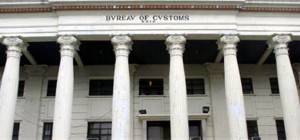BOC stumped on rotting smuggled garbage from Canada
MANILA, Philippines—The Bureau of Customs has “no game plan” for the 50 container vans of garbage from Canada, which have remained unclaimed for more than a year now and decaying fast at the Manila International Container Port, posing health and environmental risks to Manila residents.
Charo Logarta-Lagamon, chief of the BOC’s Public Information and Assistance Division, said on Tuesday they “don’t have game plan because the ball is not in our court.”
The issue, she noted, has remained “pending with the Department of Environment and Natural Resources and the Department of Foreign Affairs.”
“We can only think of contingencies, but we have no say (about the disposal of the garbage shipment),” she told the Philippine Daily Inquirer.
Lagamon recalled that the Department of Finance-attached agency’s Enforcement Group “came up with options like disposing the garbage shipment here.”
“But it wasn’t received well by some non-government organizations,” she pointed out.
According to the PIAD head, “these options were crafted because the trash is decaying fast.”
Customs records showed that the 50 container vans arrived in six batches between June and August 2013, shipped by Chronic Incorporated, an export company based in Ontario, Canada.
The consignee of the shipment, Chronic Plastics, a firm based in Valenzuela City, has yet to claim the container vans.
In January, the bureau opened 18 of the containers, which contained “mixed garbage.” It decided to stop opening the rest of the vans to prevent further contamination in case they, too, contained hazardous waste.
For mis-declaration of the shipment as “plastic scraps for recycling,” the agency has filed criminal charges against a certain Adelfa Eduardo, the owner of the company, and its two customs brokers for violating the Tariff and Customs Code of the Philippines, among others.
Customs Deputy Commissioner Ariel Nepomuceno had said it was the shipper’s responsibility to take the trash shipment back to Canada.
Romy Hidaldgo, an official of the EcoWaste Coalition and the NGO representative to the National Solid Waste Management Committee, expressed disgust over the attempt to smuggle Canadian garbage into the country.
“We are not a garbage dump,” he said. “We condemn in the strongest possible terms this unabashed attempt to dump hazardous waste misrepresented as recyclable plastics into our country.”
Hidaldo emphasized “this botched illegal importation violates our Constitution and our major environmental laws, including Republic Act 9003, the Solid Waste Management Act.”
The DFA has repeatedly requested the Canadian Embassy here for assistance in returning as soon as possible the garbage shipment back to Canada.
Based on the Basel Convention on the Control of Transboundary Movements of Hazardous Wastes, which both the Philippines and Canada have ratified, it is the responsibility of the country from which the waste originated for returning the waste to its port of origin “within 30 days from the time the state of export has been informed about the illegal traffic.”
Canadian Ambassador to the Philippines Neil Reeder, however, told the foreign office that they had “no domestic or international authority to compel the shipper to return the shipment to Canada.”
He also claimed that the exporter Chronic Incorporated has “not been successful in finding a third country to which the shipment could be sent.”
Citing World Trade Organization commitments, the Bureau of Customs asserted the Canadian government was responsible for ensuring its shipments to foreign countries are safe and complying with international agreements.
DENR Secretary Ramon Paje, meanwhile, insisted the hazardous shipment should be re-exported overseas.
If the Canadian garbage was treated in the country, it might set a “troubling precedent,” making the Philippines a “dumping ground” for foreign hazardous wastes, he warned.
RELATED STORIES
BOC open to PH as garbage dump
Customs looks into importation of garbage from Canada















